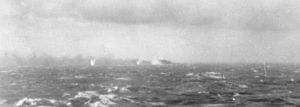
Back المعركة الأخيرة للبارجة بسمارك Arabic הקרב האחרון של ביסמרק HE A Bismarck csatahajó utolsó csatája Hungarian Pertempuran terakhir kapal perang Bismarck ID Caccia alla Bismarck Italian 비스마르크 추격전 Korean Pertempuran terakhir kapal tempur Bismarck Malay Последний бой «Бисмарка» Russian ยุทธนาวีครั้งสุดท้ายของบิสมาร์ค Thai Bismarck'ın son muharebesi Turkish
| Last Battle of the Bismarck | |||||||
|---|---|---|---|---|---|---|---|
| Part of Operation Rheinübung | |||||||
 Surrounded by shell splashes, Bismarck burns on the horizon | |||||||
| |||||||
| Belligerents | |||||||
|
|
| ||||||
| Commanders and leaders | |||||||
|
|
| ||||||
| Strength | |||||||
|
Aircraft carrier Ark Royal 2 heavy cruisers 8 destroyers |
1 Battleship
| ||||||
| Casualties and losses | |||||||
|
49 killed 5 wounded Mashona scuttled Rodney lightly damaged |
2,200 killed[a] 110 captured Bismarck scuttled[1] | ||||||
The last battle of the German battleship Bismarck took place in the Atlantic Ocean approximately 300 nautical miles (560 km; 350 mi) west of Brest, France, on 26–27 May 1941 between the German battleship Bismarck and naval and air elements of the British Royal Navy. Although it was a decisive action between capital ships, it has no generally accepted name. It was the culmination of Operation Rheinübung where the attempt of two German ships to disrupt the Atlantic Convoys to the United Kingdom failed with the scuttling of the Bismarck.
The last battle consisted of four main phases. The first phase late on 26 May consisted of air strikes by torpedo bombers from the British aircraft carrier Ark Royal, which disabled Bismarck's steering gear, jammed her rudders in a turning position and prevented her escape. The second phase was the shadowing and harassment of Bismarck during the night of 26/27 May by British and Polish destroyers, with no serious damage to any ship. The third phase on the morning of 27 May was an attack by the British battleships King George V and Rodney, supported by the heavy cruisers Norfolk and Dorsetshire. After about 100 minutes of fighting, Bismarck was sunk by the combined effects of shellfire, torpedo hits and deliberate scuttling.[1][2] On the British side, Rodney was lightly damaged by near-misses and by the blast effects of her own guns.[3] British warships rescued 110 survivors from Bismarck before being obliged to withdraw because of an apparent U-boat sighting, leaving several hundred men to their fate. A U-boat and a German weathership rescued five more survivors. In the final phase, the withdrawing British ships were attacked the next day on 28 May by aircraft of the Luftwaffe, resulting in the loss of the destroyer HMS Mashona.
Cite error: There are <ref group=lower-alpha> tags or {{efn}} templates on this page, but the references will not show without a {{reflist|group=lower-alpha}} template or {{notelist}} template (see the help page).
- ^ a b "Who sank the Bismarck - The British or the Germans? We are convinced the answer is "Both!!" Bismarck unquestionably would have sunk due to progressive flooding hours after the battle ended [...] There is enough evidence to indicate that [CDR Oels] ordered the ship scuttled..." Cameron et al. 2002, p. 50
- ^ Cite error: The named reference
GC801was invoked but never defined (see the help page). - ^ Kennedy, pp. 206, 283.